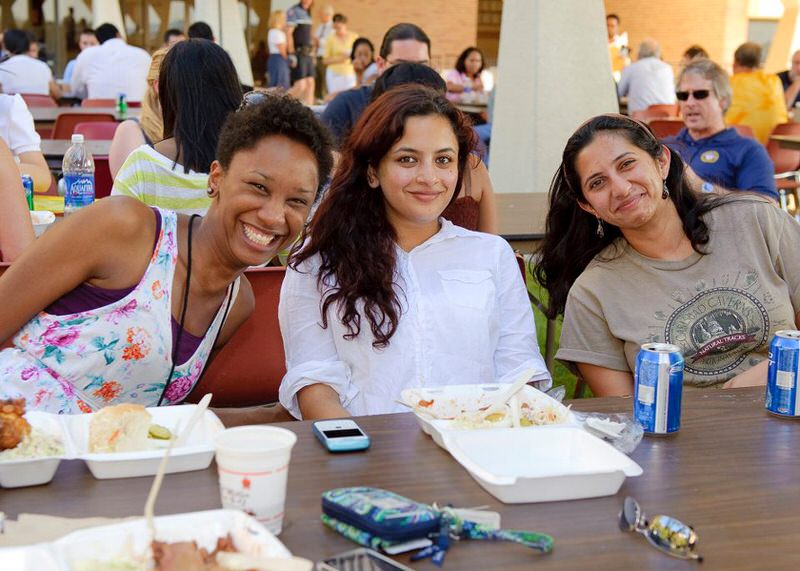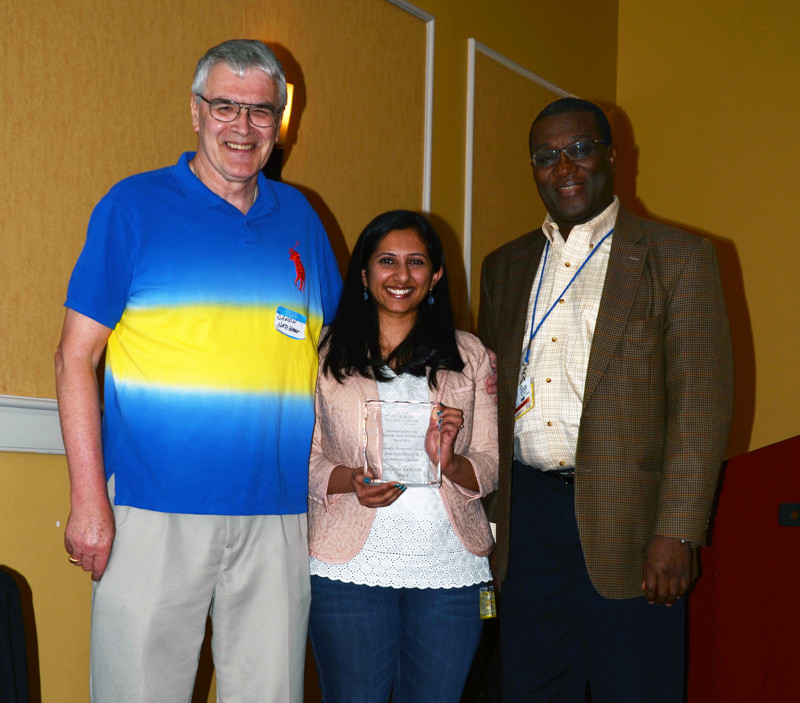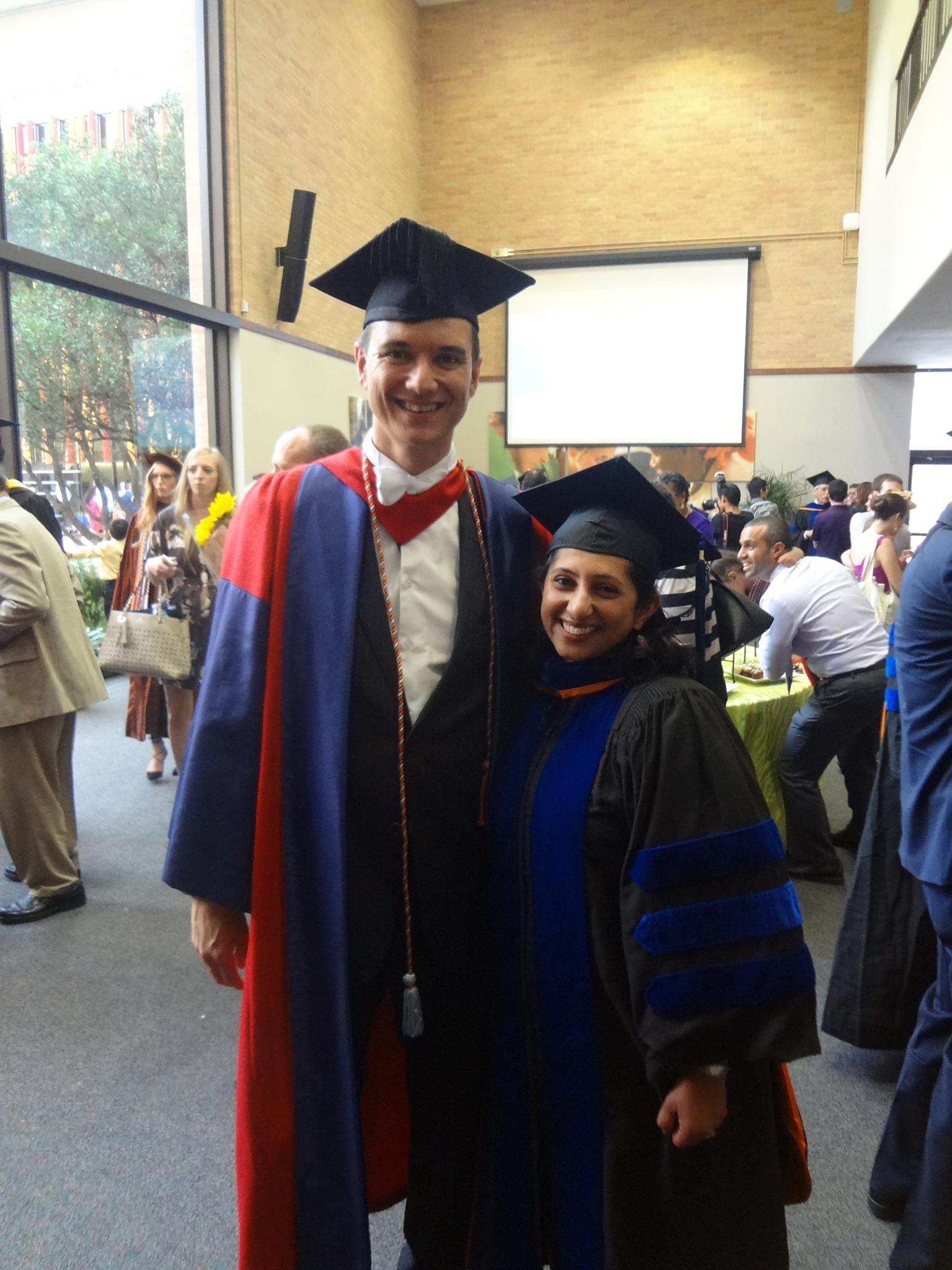In Press: Dr. Aparna Gorthi Publishes in Nature Journal

 Dr. Aparna Gorthi first author paper has just been published in Nature. She graduated with a Ph.D. in Cellular and Structural Biology with a focus on Cancer Biology in August 2015.
Dr. Aparna Gorthi first author paper has just been published in Nature. She graduated with a Ph.D. in Cellular and Structural Biology with a focus on Cancer Biology in August 2015.
During her time as a graduate student, she worked with Dr. Alex Bishop on her doctoral research.
“I chose his lab because of his enthusiasm to chase very pertinent questions in cancer research and the cutting-edge tools he was using to do so. He has been a really great mentor and I’ve learnt the value of perseverance from him! My graduate school was a fantastic experience and ideally suited to someone like me who came from a non-traditional background (undergraduate degree in computer science).”
During her time at graduate school, she was supported by a predoctoral fellowship from the Cancer Prevention and Research Institute of Texas (CPRIT) Research Training Award as well as a UT System Translational Sciences Training (TST) Across Disciplines Scholarship through The Institute for Integration of Medicine and Science. Dr. Gorthi was the recipient of the CSB Rennels Memorial Award for Excellence in Graduate Studies in 2013.She was also the graduate school representative to the Student Government Association for a two-year term and served on the Library Committee for one year.
 “I am thankful to the various opportunities and recognition awarded to me by the school and more importantly, the constant support and advice I have received from all the faculty here, particularly my thesis committee members, my scholarship mentors (Dr. Kay Oyajobi, Dr. Linda McManus, Dr. Michael Lichtenstein and Dr. LuZhe Sun), and Dr. Nicquet Blake.”
“I am thankful to the various opportunities and recognition awarded to me by the school and more importantly, the constant support and advice I have received from all the faculty here, particularly my thesis committee members, my scholarship mentors (Dr. Kay Oyajobi, Dr. Linda McManus, Dr. Michael Lichtenstein and Dr. LuZhe Sun), and Dr. Nicquet Blake.”
As part of her Translational Science Scholarship, she had the opportunity to shadow an oncologist running clinical trials.
“It was an eye-opening experience and learnt a very real human angle to the benchwork we do as researchers,” she said.
Since graduating, Aparna is now a postdoctoral fellow at the Greehey Children’s Cancer Research Institute in the lab of Dr. Yidong Chen. The main focus of her graduate and postdoctoral research has been Ewing sarcoma, a highly aggressive bone and soft tissue cancer in children driven by a fusion oncogene – EWS-FLI1.
 “I have been studying the various roles of EWS-FLI1 in transcription, DNA damage response and DNA repair, and characterizing the weak links and vulnerabilities of this cancer,” she said. “We have discovered that the aberrant transcriptional drive of this oncogene leads to accumulation of R-loops and a lack of appropriate DNA damage response in Ewing sarcoma.”
“I have been studying the various roles of EWS-FLI1 in transcription, DNA damage response and DNA repair, and characterizing the weak links and vulnerabilities of this cancer,” she said. “We have discovered that the aberrant transcriptional drive of this oncogene leads to accumulation of R-loops and a lack of appropriate DNA damage response in Ewing sarcoma.”
Her work is aimed at identifying potential targets for therapeutic intervention to improve outcomes associated with Ewing sarcoma.
“Like with many other cancers, treatment of Ewing sarcoma is still a challenge. Prognosis for patients who present with advanced disease is dismally low (at less than 30 percent),” she said. “While Ewing patients with early stage disease respond well to standard therapy, it has also lead to long-term co-morbidity with over two-thirds of these young survivors developing  secondary cancers and severe chronic health conditions. Being able to potentially have an impact on the quality of life of these young survivors is what drives our research.”
secondary cancers and severe chronic health conditions. Being able to potentially have an impact on the quality of life of these young survivors is what drives our research.”
Dr. Gorthi is excited to be published in Nature for a variety of reasons.
“Nature as a journal has one of the highest impact factors across all disciplines of science and it is every scientist’s dream and desire that their research be published and recognized at those high standards. It also has a global readership and hence allows our work to be seen by other researchers, which really gives me the feeling that the work I did has a real impact,” she said. “The satisfaction associated with the recognition serves as fuel for my future research career to chase bigger scientific problems as well!”
 In the future, Dr. Gorthi would like to continue ongoing research projects at the intersection of cancer research and big data bioinformatics while she prepares for setting up her own lab when the opportunity presents itself.
In the future, Dr. Gorthi would like to continue ongoing research projects at the intersection of cancer research and big data bioinformatics while she prepares for setting up her own lab when the opportunity presents itself.
“I have been truly bitten by the scientific research bug at this point and all my career plans revolve around unanswered questions in translational cancer research. I had to get back to work three weeks after my son was born to address the paper submission. If anything, the experience taught me that if I could do that, I would probably survive other challenges that would come my way in this career path! I have had excellent opportunities in this institution to further my professional career and I hope to continue doing exciting science here as a postdoctoral fellow in Dr. Yidong Chen’s lab.”
